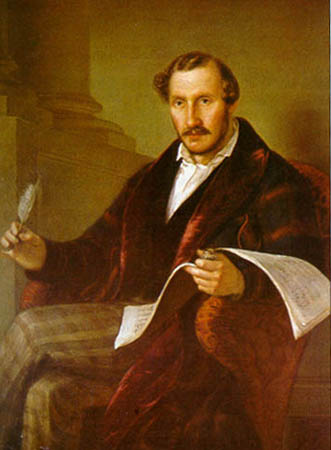
Portrait of Gaetano Donizetti, Museo del Teatro alla Scala (public domain)
Roberto Devereux is a tragedia lirica, or tragic opera, by Gaetano Donizetti (1797–1848). Salvadore Cammarano (1801–1852), the Neapolitan librettist who worked with Donizetti on a number of his previous operas, wrote the libretto.
The final opera in Donizetti’s “Tudor trilogy,” Roberto Devereux focuses on the elderly Queen Elizabeth I, who is forced to sign the death warrant of the nobleman she loves. The opera’s story was inspired by true historical events but history is used merely as a springboard from which the operatic imagination can soar. Roberto Devereux mirrors the successful structure of Donizetti’s earlier Lucia di Lammermoor: a first act that lays out the issues at stake and introduces the musical language; a second act fashioned as a single dramatic arc; and three intense shorter scenes for the final act.
Gaetano Donizetti composed about 75 operas as well as orchestral and chamber music in a career abbreviated by mental illness and premature death. Most of his works disappeared from the public eye after his death, but critical and popular opinion of the rest of his massive repertoire has grown considerably over the past 50 years.
October 28, 1837: World Premiere at Teatro San Carlo in Naples, Italy
First performed two years after Maria Stuarda and Lucia di Lammermoor, Roberto Devereux shows Donizetti at the height of his musical and dramatic powers. Within a few years of the opera’s success, it was performed in most European cities.
1960s
Revivals of Roberto Devereux started at the San Carlo in Naples in 1964 starring Leyla Gencer. Montserrat Caballé appeared in a combination of concert performances and staged productions between December 1965 and 1978.
1970: New York Premiere at the New York City Opera
The New York City Opera performed Roberto Devereux in October 1970 as the first part of the “Three Queens” trilogy, starring Placido Domingo and Beverly Sills.
March 24, 2016 : Met Opera Premiere
Sir David McVicar, who directed the Met premieres of Anna Bolena and Maria Stuarda, returned to stage the final installment in the series. Acclaimed bel canto soprano Sondra Radvanovsky sings Elizabeth I. (During the same season, she took on the title roles in Anna Bolena and Maria Stuarda, a famous feat performed by Beverly Sills at New York City Opera in the 1970s and not repeated in New York since.)






